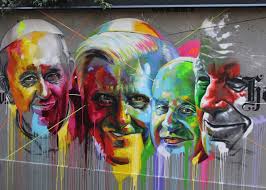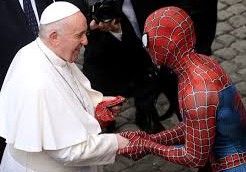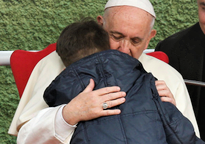
All or Nothing
Evidently, the controversies surrounding the nomination to the U.S. Supreme Court of Amy Coney Barrett include an accusation that people who oppose her are resurrecting the anti-Catholicism of the past.
This was news to me until I read a piece in the New York Times by Elizabeth Bruenig, a Times editorial writer who identifies as a Catholic. I still don’t think most Americans care what religion Barrett professes, just about her approach to the court and about what decisions she will make.
But Bruenig does bring up an interesting issue: the old question of whether Catholicism is really compatible with American values. Catholicism, she writes, requires a commitment to values that reject “individualism, self-reliance, liberty, equality and tolerance” in favor of a “common good” philosophy.
Clashes with American Values
Although that may be true historically, Catholics’ views of politics and their role in society today differ little from those of people of any religion, according to polls. It is true, however, that Catholic social teaching, which emphasizes concern for others, especially the poor, clashes with many American values even if many Catholics ignore their church’s teachings.
Bruenig says American practice and values are based on the philosophy of John Locke, who died in 1704 and who is one of the principal architects of modern, “liberal democracy.” Indeed, Locke is quoted in our Declaration of Independence, and the founders’ notion of the “separation of church and state” is said to be due to Locke’s influence.
She writes, however, that Locke’s idea of this separation also needed to be personal; that is, all people of faith need to separate their faith from their civic responsibilities.
“Roman Catholicism,” she writes, “does not readily distinguish between public and private moral obligations.” Locke, on the other hand, believed that “the willingness to make that distinction was critical to participation in a tolerant society.”
She quotes political theorist Jean Bethke Elshtain, who wrote in a 1999 essay, “Locke drew up a strong civic map with religion within one sphere and government in another. A person could be a citizen of each so long as that citizen never attempted to merge and blend the two.”
Could Not Be Trusted
Locke notably excluded Catholics “from the religions meriting toleration because he suspected they could not be trusted to leave their faith in the appropriate sphere.”
In my view, the search for God doesn’t allow for such distinctions. Sincere faith doesn’t allow us to have drawers into which we place the various parts of our lives. We can’t have one drawer for “faith,” another for “politics,” another for “work life,” etc. Our faith must cover every aspect of our lives. And I don’t believe this just applies to Catholics.
The consistent message of recent popes, in fact, starting at about the time of Leo XIII, who died in 1903, has been to show how faith affects civic issues. Leo XIII wrote about a fair wage, safe working conditions and the right to form unions. In 1961, Pope John XXIII issued an encyclical promoting human dignity. It taught that the state must sometimes intervene in matters of health care, education, and housing.
Assistance to the Poor
Pope Paul VI, who died in 1978, called upon rich nations to assist the poor. An encyclical of Pope John Paul II in 1991 includes teachings on the usefulness, and the limits, of a market economy.
In 2003, the U.S. Conference of Catholic Bishops and the Mexican Episcopal Conference issued a joint document on the just treatment of immigrants. An encyclical from Pope Francis issued in 2013 touches on obligations Christians have to the poor, and the duty to establish and maintain just economic, political, and legal order. Another by Pope Francis in 2015 critiqued consumerism and irresponsible development, and lamented environmental degradation and global warming.
It’s clear that Catholics, liberal or conservative, Democrat or Republican, must apply their faith to every aspect of life. In my opinion, everyone who sincerely seeks God must do the same.




